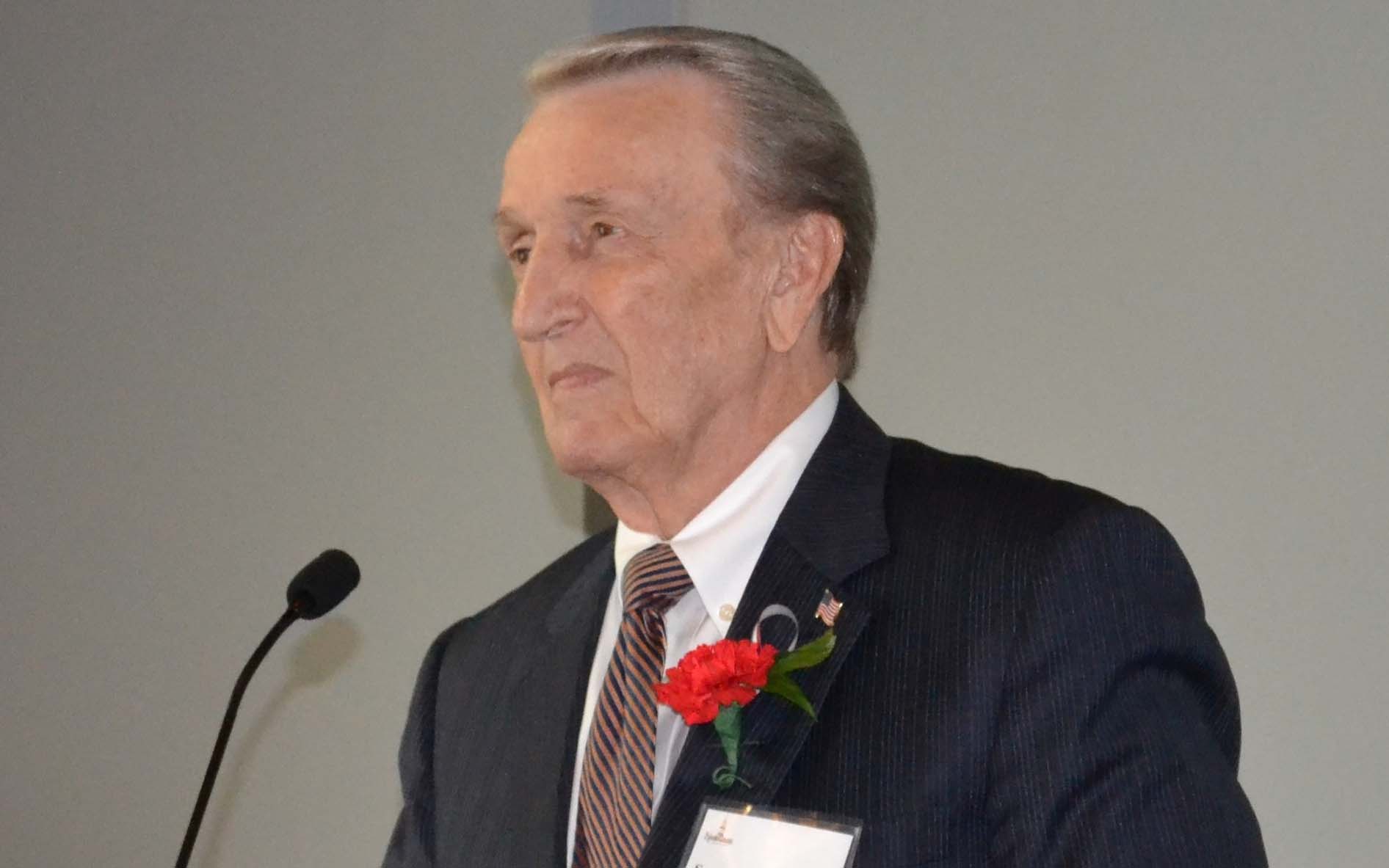Dale Leon Bumpers August 12, 1925 - January 1, 2016
January 11-17, 2016
By Jay Edwards
Former Arkansas Governor and U.S. Senator Dale Bumpers was the guest speaker at the annual Veteran’s Day Luncheon of the Pulaski County Bar Association in 2012. The following article on his talk from that day was published in the Daily Record on Nov. 30, 2012. Like so many around Arkansas and the nation, we mourn his recent passing.
At the beginning of his talk to the PCBA at the Veterans Day Luncheon, the lawyer from Charleston who went on to become one of this country’s most esteemed U.S. Senators recognized that Judge “Billy Roy Wilson” was in the audience and decided to share a story regarding his “long-time friend.”
“I remember when Bill was in law school,” Dale Bumpers began, “and Dean Leflar said to the class, ‘You have three hours to write the answers to these questions. If you write one word after I ring the bell at the end of that three hours, you flunk.’”
“At the end of the three hours Leflar rang the bell and everyone walked to the front to turn in their tests, except Bill, he just kept writing. Finally Dean Leflar came back to Bill’s desk and said, ‘Did you hear what I said?’
‘Yes sir.’
‘Did you hear me say that if you wrote one word after the bell rang that you would flunk?’
‘Yes sir.’
“Leflar said, ‘You flunk.’”
“Bill said, ‘Just a minute. Do you know who I am?’
‘No I don’t.’
‘Do you know my old man?’
‘No I don’t.’
“With that Bill folded up his test, walked up to the Dean’s desk, shuffled his test among all the others and walked out.”
“So you see we knew what we were doing when we made him a federal judge.”
As it says on the Encyclopedia of Arkansas website, Dale Leon Bumpers was one of the state’s most successful politicians in the last half of the twentieth century. As governor, Bumpers initiated the enactment of historic legislation, including a restructuring of the tax system and reorganization of the state’s government, and as a U.S. senator (1975–1999), he was a fiscally conservative, socially liberal legislator recognized for his oratorical skills.
Those skills, even at age 87, are still present. “This is the first speech I’ve made in over two years,” Bumpers said. “When I began practicing law I was pretty lonely, being the only lawyer in South Franklin County. Betty and I started saving our money so we could go to Hot Springs to the Bar Association Convention; she made $120 a month teaching school. I thought that perhaps I could make myself known to all the Ed Wrights and Ed Lesters and all the other you know who’s.
Betty and I thoroughly enjoyed that and we got to meet so many fine people. Like Ben Allen, who became a lifetime friend, and Maurice Mitchell, one of the finest men I ever knew in my life, And Bill Bowen, who I have lunch with every Friday. Time really flies.”
Bumpers said the most honorable thing he ever did was to be the attorney for the Charleston School District. It was the first school district to integrate in the former Confederate States of America.
Betty Bumpers was a third grade teacher there when it was integrated.
“The first day she stood at the window on the first floor,” Bumpers recalled, “where her classroom was and watched as the school bus, loaded with 22 black children, pulled to a stop in front. Four were in her class, two girls and two boys.”
40 years later the Bumpers went from Washington to Charleston to be a part of a ceremony and reunion for that first integrated class.
“The two boys who were in her class were not there,” Bumpers said, “but both of the girls were, they were in their late 50’s and both had their Phd’s. When you think of the wasted talent through all the years, just to get two Phd’s. It was absolutely unnecessary. I have been as proud of the role I played in that as anything I’ve ever done in my life.”
That story was a sidebar Bumpers said, to the strength of the constitution of the United States.
“My father was not a scholar, he was a schoolteacher. He went to Hendrix in 1897. He didn’t go back because he was embarrassed he didn’t have any clothes. But he was a good Methodist and his father wanted him to go to Hendrix so he did.”
“But the strength of the constitution was heard often in subject matter at the dinner table in our home, where my father talked endlessly about the Presidents of the United States. And we learned at an early age that we could grow up to be president, if we really wanted to be.
“One time he took us to Booneville to see Franklin Roosevelt when I was 12 years old. When Roosevelt came out of the back of the train; he was held up by his son. I pulled on my father’s shirtsleeve and said, ‘Dad, what’s wrong with him?’
He said, ‘I’ll tell you later.’”
“On the way home my father said, ‘I’m going to tell you boys about Franklin Roosevelt, he had polio. You remember this - he can’t walk to this day, because he had polio. But he could become president. Now if a man who can’t walk can become president, then there is no reason why you boys can’t become president too.’
“I’ve often thought of that.”



